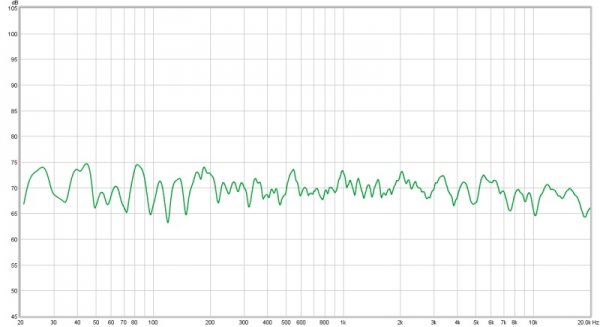Time Alignment For Subs
- Thread starter jcmusic
- Start date
You are using an out of date browser. It may not display this or other websites correctly.
You should upgrade or use an alternative browser.
You should upgrade or use an alternative browser.
Assuming there is a phase control on your sub, play a test tone through the whole system at the Xover frequency and adjust for maximum volume, or alternatively wire the sub out-of-phase and repeat the procedure looking for the lowest volume (which many people may find easier to perceive)
Assuming there is a phase control on your sub, play a test tone through the whole system at the Xover frequency and adjust for maximum volume, or alternatively wire the sub out-of-phase and repeat the procedure looking for the lowest volume (which many people may find easier to perceive)
That would give you phase alignment, not time alignment, no?
Digital Signal Processing
Only if applied on all channels (which is usually not the case). Most folks insert a DSP box just to tame their subs, getting worse time alignment because they usually involve an A/D/A conversion, introducing delay for the subs.
If located the same distance as the mains and with a crossover around 80 Hz, a sealed sub typically needs about 2-5 ms of delay, ported subs 5+ ms depending on port length, and horn subs 12-15+ ms depending on horn length. I've never seen an instance when the sub needs less delay than the mains unless the sub is located a lot closer to the listener. Typically one can move the subs further from the listening position relative to the mains to time align if they don't have DSP.
Just for reference, the Behringer DCX2496 has a latency of 1 ms and the miniDSP has 1.5 ms. If you have passive subs, the newer DSP amps by Peavey, Crest, and Behringer have a latency of less than 1 ms and you can increase it with the delay setting. Active subs with DSP built in will already have some latency.
Just for reference, the Behringer DCX2496 has a latency of 1 ms and the miniDSP has 1.5 ms. If you have passive subs, the newer DSP amps by Peavey, Crest, and Behringer have a latency of less than 1 ms and you can increase it with the delay setting. Active subs with DSP built in will already have some latency.
Ok guys a little more info, this is my 2 channel system corner horns dual subs. The subs are about 2 feet closer to the LP than the mains the room is symetrical for the most part does this help?
What are you trying to show us?? Do you have a step response for the system?? That's how you are going to see any timing issues. It looks like it is summing well the only I thing I see is your average spl level looks a bit lower below about 150hz.
Rob
Rob
There are many ways to do it. None of them involve extending your wet finger into the breeze. 
This is a good thread which demonstrates the variety of ways to get at good time/phase alignment:
http://www.hometheatershack.com/forums/rew-forum/28894-case-study-sub-alignment-using-rew-v5.html
This is a good thread which demonstrates the variety of ways to get at good time/phase alignment:
http://www.hometheatershack.com/forums/rew-forum/28894-case-study-sub-alignment-using-rew-v5.html
There are some pretty clever ways mentioned that thread if you take a moment to digest it. I especially like John's method mentioned in post #11 of inverting polarity to get the largest dip and then reversing polarity. Of course, there's no perfect way to do it. I am no expert. But I have watched an expert do it properly. It really takes some ability with REW, the right gear and serious patience.
Well to be very honest I have no idea how to read what I am looking at!!! Is there a more simple way? Something you could explain to me step by step?
Everyone integrating a sub into their system should read Barry Ober's page on subs (JL Audio Technical Support): http://soundoctor.com/whitepapers/subs.htm
The phase control on the sub just adds delay, and most of the time you actually need to delay the mains, not the subs.
There are some subs available that have internal DSP where you can delay the high pass output: Revel's new ones using the LFO software and Triad's. Or you can use a digital crossover such as a DEQX, Trinnov or pro audio unit. Or you can do all the crossover inside a computer and feed a multichannel DAC like an ExaSound.
The easiest way to integrate subs is just to play with delay until you get flattest response. It might take you some time to get there and you will never know if it is properly integrated (for example you may have just added a full cycle of delay to subs or mains and gotten a good SPL trace but the two are not in time alignment). The proper way to do it requires looking at the time domain. I look at impulse response and phase; it's not something that I have seen written down anywhere, and it requires a good understanding of acoustical measurements.
The phase control on the sub just adds delay, and most of the time you actually need to delay the mains, not the subs.
There are some subs available that have internal DSP where you can delay the high pass output: Revel's new ones using the LFO software and Triad's. Or you can use a digital crossover such as a DEQX, Trinnov or pro audio unit. Or you can do all the crossover inside a computer and feed a multichannel DAC like an ExaSound.
The easiest way to integrate subs is just to play with delay until you get flattest response. It might take you some time to get there and you will never know if it is properly integrated (for example you may have just added a full cycle of delay to subs or mains and gotten a good SPL trace but the two are not in time alignment). The proper way to do it requires looking at the time domain. I look at impulse response and phase; it's not something that I have seen written down anywhere, and it requires a good understanding of acoustical measurements.
Thanks for the link and info this is the best info I have ever read on subs and intergration.
Everyone integrating a sub into their system should read Barry Ober's page on subs (JL Audio Technical Support): http://soundoctor.com/whitepapers/subs.htm
The phase control on the sub just adds delay, and most of the time you actually need to delay the mains, not the subs.
There are some subs available that have internal DSP where you can delay the high pass output: Revel's new ones using the LFO software and Triad's. Or you can use a digital crossover such as a DEQX, Trinnov or pro audio unit. Or you can do all the crossover inside a computer and feed a multichannel DAC like an ExaSound.
The easiest way to integrate subs is just to play with delay until you get flattest response. It might take you some time to get there and you will never know if it is properly integrated (for example you may have just added a full cycle of delay to subs or mains and gotten a good SPL trace but the two are not in time alignment). The proper way to do it requires looking at the time domain. I look at impulse response and phase; it's not something that I have seen written down anywhere, and it requires a good understanding of acoustical measurements.
Similar threads
- Replies
- 0
- Views
- 561
- Replies
- 7
- Views
- 786
- Replies
- 4
- Views
- 333
Staff online
-
treitz3Super Moderator
Members online
- luca.pelliccioli
- matthias
- tommy54
- Rob181
- best
- Hasse
- Armsan
- itay123
- Argonaut
- cloudcrow
- Be Quiet...Listen
- Frankie67
- sonrock
- Golum
- GroovySauce
- bryans
- patleguen77170
- Emilzebira
- the sound of Tao
- bonzo75
- Adelmor
- treitz3
- andromedaaudio
- Geoffkait
- GuyB
- Sarge
- dminches
- wbfhet
- metaldetektor
- Echolane
- Elberoth
- iaxel
- hopkins
- XV-1
- Bones13
- wbass
- TooCool4
- Ferris010
- Romalpa
- Mark Preston
- Florian
- budburma
- alecm
- weaver4044
Total: 842 (members: 47, guests: 795)
| Steve Williams Site Founder | Site Owner | Administrator | Ron Resnick Site Co-Owner | Administrator | Julian (The Fixer) Website Build | Marketing Managersing |













